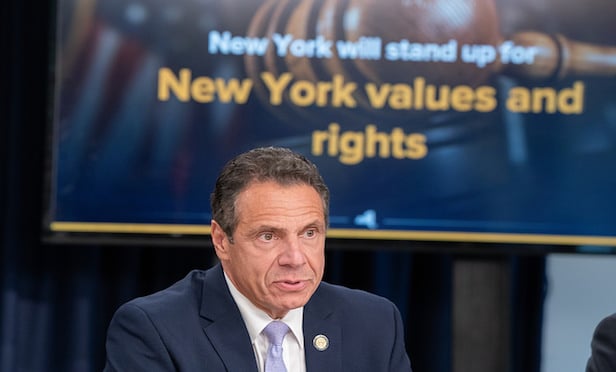ALBANY—New York State Attorney General Eric T. Schneiderman has introduced legislation that, if passed, will target unscrupulous landlords engaged in tenant harassment for much harsher punishment.
The “Tenant Protection Act of 2017” would create a new misdemeanor charge for certain acts and expand possible felony charges for other criminal conduct.
Current state law requires that state prosecutors reach what the Attorney General's office describes as “an inexplicably high evidentiary bar” in order to criminally convict a landlord of harassment of a rent-regulated tenant. That is why the Attorney General notes that there has not been a single landlord convicted of the crime since its initial enactment by the New York State Legislature 20 years ago.
The Attorney General's Tenant Protection Act would set a more reasonable standard that eliminates the need to prove physical injury to a tenant, and opens the door to prosecutions arising out of more commonplace and insidious tactics. Examples provided by the Attorney General's office include: turning off heat and hot water, exposing tenants to hazardous materials, and making rent-stabilized buildings deliberately uninhabitable for current tenants and their families.
Attorney General Schneiderman introduced the proposed legislation as a program bill on Wednesday and states that the bill will be sponsored by Senator Liz Krueger (D, WF-28th District) and State Assemblyman Joseph Lentol (D-North Brooklyn).
“The laws should protect tenants, not greedy landlords who make their buildings uninhabitable in an effort to force families out of their homes,” says Attorney General Schneiderman. “It's clear that our existing criminal laws are simply inadequate when it comes to protecting tenants from these dangerous tactics by landlords. We must give prosecutors the tools necessary to protect tenants—and stem the rising tide of tenant harassment that is undermining affordability around New York.”
The legislation would create a new class A misdemeanor that would apply to landlords and their agents who, with the intent to induce a rent regulated tenant to vacate their home, engage in a “course of conduct” that: “impairs the habitability” of the housing accommodation; creates a condition that endangers the health or safety of the tenant; or is reasonably likely to, and does in fact, “interfere with or disturb the comfort, repose, peace or quiet” of such tenant in the use of their home.
The bill would also expand the existing class E felony Penal Law offense to also make it unlawful for landlords or their agents, with the intent to induce two or more tenants in different rent regulated units to move out, engage in a similar conduct as described in the Class A misdemeanor offense.
The legislation would also make it a class E felony for a landlord to commit the new class A misdemeanor offense after he or she has been convicted of that crime or the class E felony tenant harassment offense within the preceding five years.
The new class A misdemeanor carries a maximum penalty of up to one year in jail. The class E felony carries a maximum sentence of up to four years in state prison.
Earlier this month, Attorney General Eric Schneiderman reported his office reached a settlement agreement surrounding allegations of harassment by a Lower East Side landlord to force rent-stabilized tenants to move out of its properties.
ALBANY—
The “Tenant Protection Act of 2017” would create a new misdemeanor charge for certain acts and expand possible felony charges for other criminal conduct.
Current state law requires that state prosecutors reach what the Attorney General's office describes as “an inexplicably high evidentiary bar” in order to criminally convict a landlord of harassment of a rent-regulated tenant. That is why the Attorney General notes that there has not been a single landlord convicted of the crime since its initial enactment by the
The Attorney General's Tenant Protection Act would set a more reasonable standard that eliminates the need to prove physical injury to a tenant, and opens the door to prosecutions arising out of more commonplace and insidious tactics. Examples provided by the Attorney General's office include: turning off heat and hot water, exposing tenants to hazardous materials, and making rent-stabilized buildings deliberately uninhabitable for current tenants and their families.
Attorney General Schneiderman introduced the proposed legislation as a program bill on Wednesday and states that the bill will be sponsored by Senator Liz Krueger (D, WF-28th District) and State Assemblyman Joseph Lentol (D-North Brooklyn).
“The laws should protect tenants, not greedy landlords who make their buildings uninhabitable in an effort to force families out of their homes,” says Attorney General Schneiderman. “It's clear that our existing criminal laws are simply inadequate when it comes to protecting tenants from these dangerous tactics by landlords. We must give prosecutors the tools necessary to protect tenants—and stem the rising tide of tenant harassment that is undermining affordability around
The legislation would create a new class A misdemeanor that would apply to landlords and their agents who, with the intent to induce a rent regulated tenant to vacate their home, engage in a “course of conduct” that: “impairs the habitability” of the housing accommodation; creates a condition that endangers the health or safety of the tenant; or is reasonably likely to, and does in fact, “interfere with or disturb the comfort, repose, peace or quiet” of such tenant in the use of their home.
The bill would also expand the existing class E felony Penal Law offense to also make it unlawful for landlords or their agents, with the intent to induce two or more tenants in different rent regulated units to move out, engage in a similar conduct as described in the Class A misdemeanor offense.
The legislation would also make it a class E felony for a landlord to commit the new class A misdemeanor offense after he or she has been convicted of that crime or the class E felony tenant harassment offense within the preceding five years.
The new class A misdemeanor carries a maximum penalty of up to one year in jail. The class E felony carries a maximum sentence of up to four years in state prison.
Earlier this month, Attorney General Eric Schneiderman reported his office reached a settlement agreement surrounding allegations of harassment by a Lower East Side landlord to force rent-stabilized tenants to move out of its properties.
Want to continue reading?
Become a Free ALM Digital Reader.
Once you are an ALM Digital Member, you’ll receive:
- Breaking commercial real estate news and analysis, on-site and via our newsletters and custom alerts
- Educational webcasts, white papers, and ebooks from industry thought leaders
- Critical coverage of the property casualty insurance and financial advisory markets on our other ALM sites, PropertyCasualty360 and ThinkAdvisor
Already have an account? Sign In Now
*May exclude premium content© 2024 ALM Global, LLC, All Rights Reserved. Request academic re-use from www.copyright.com. All other uses, submit a request to [email protected]. For more information visit Asset & Logo Licensing.








